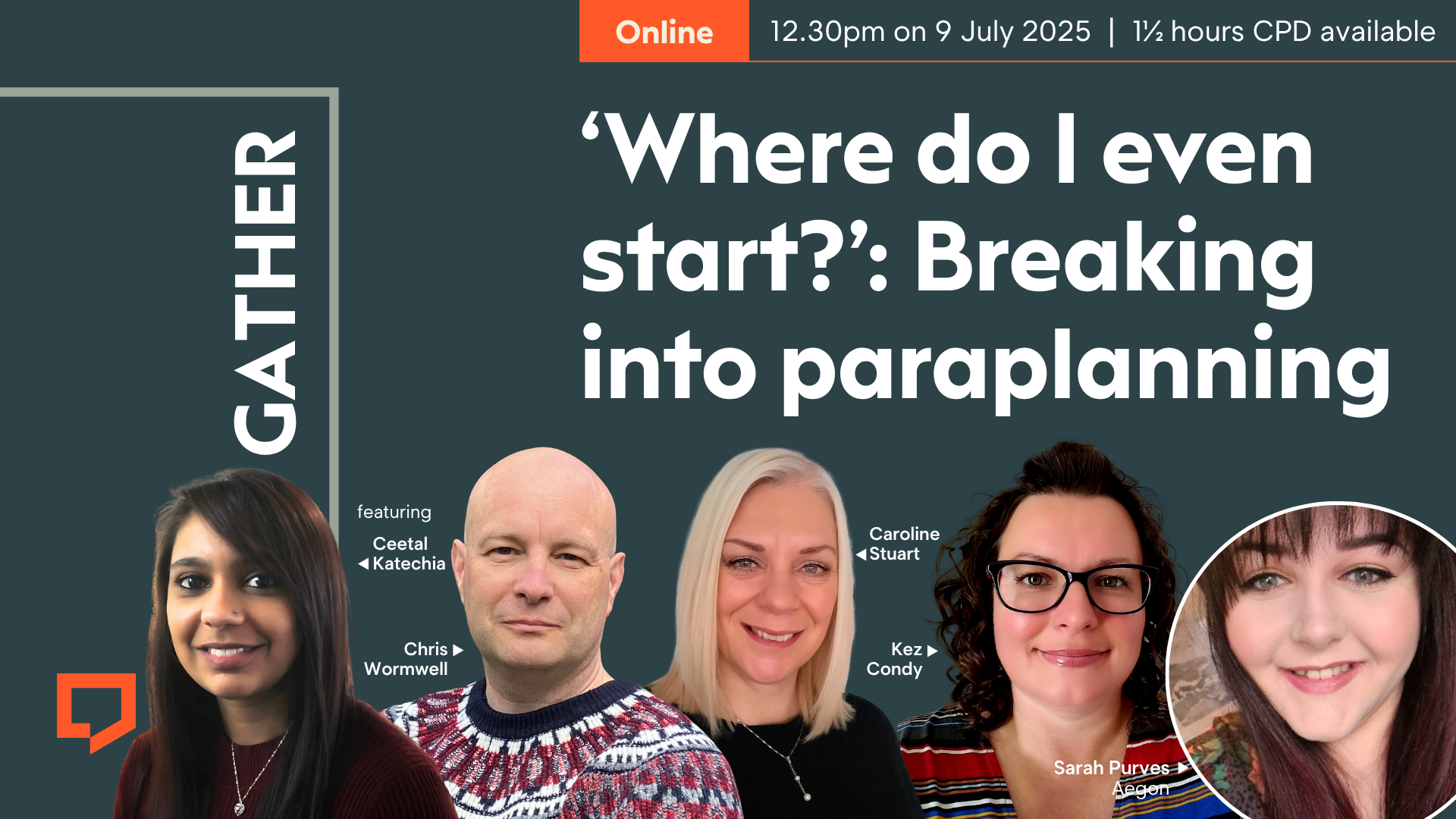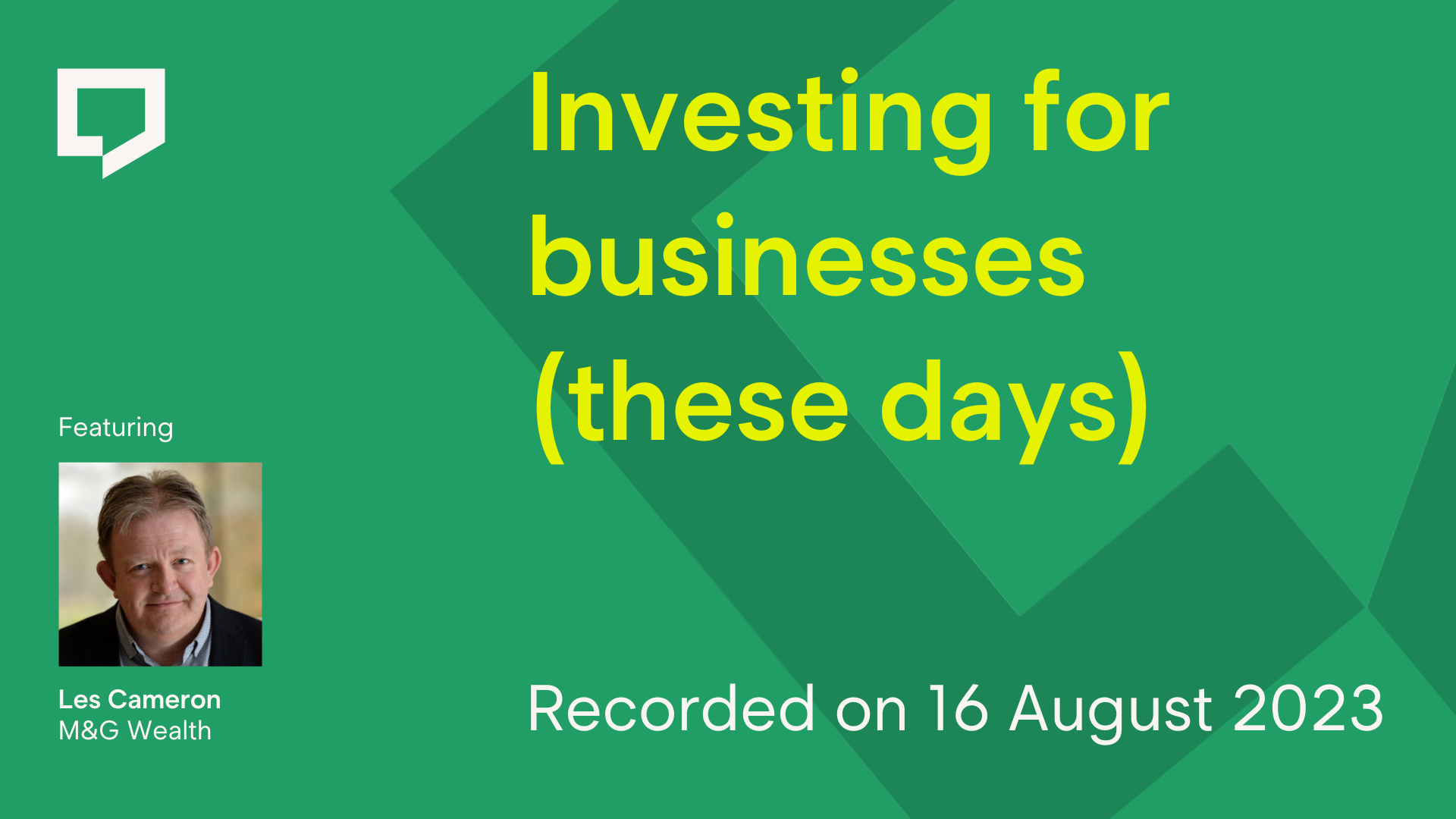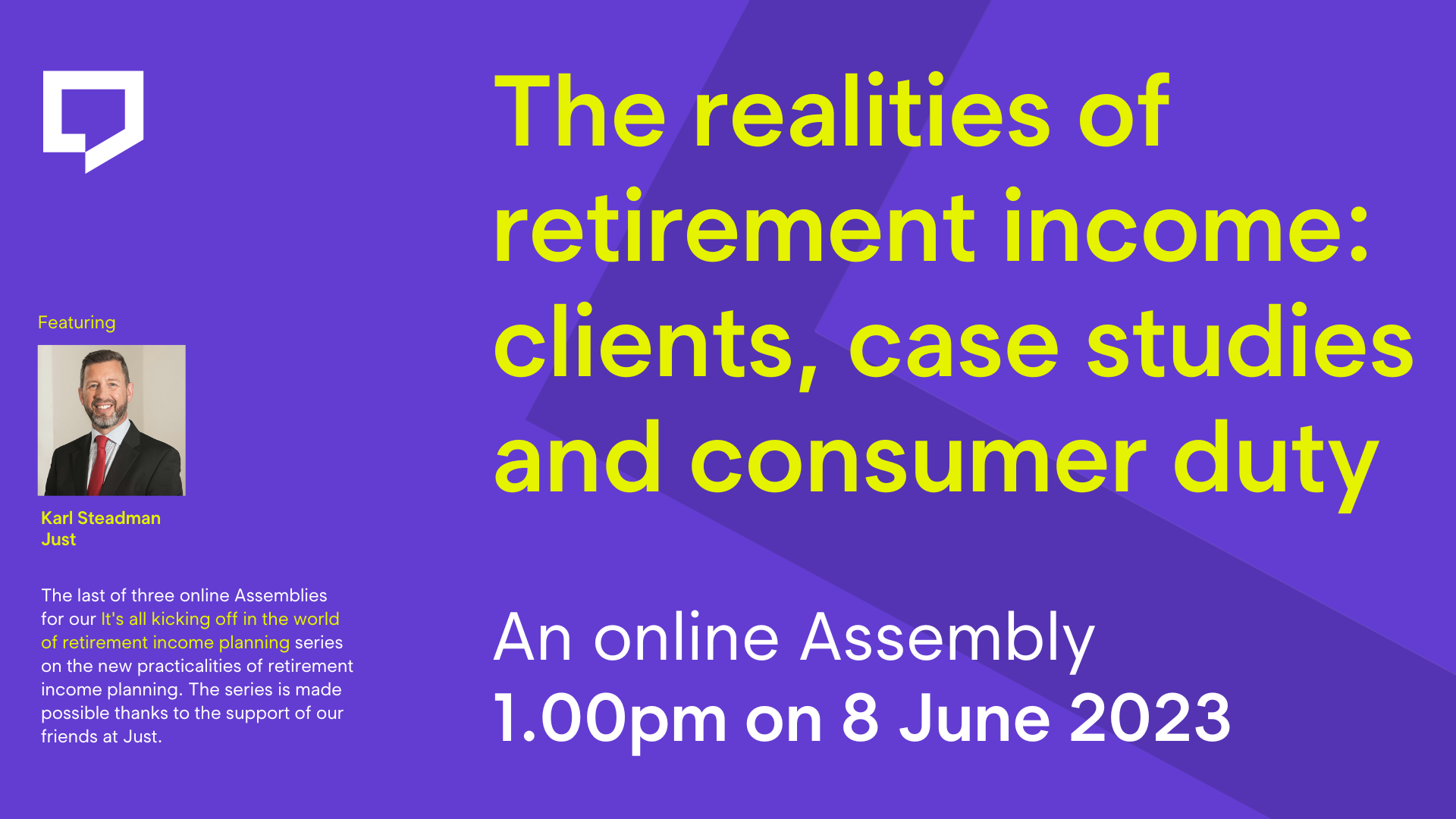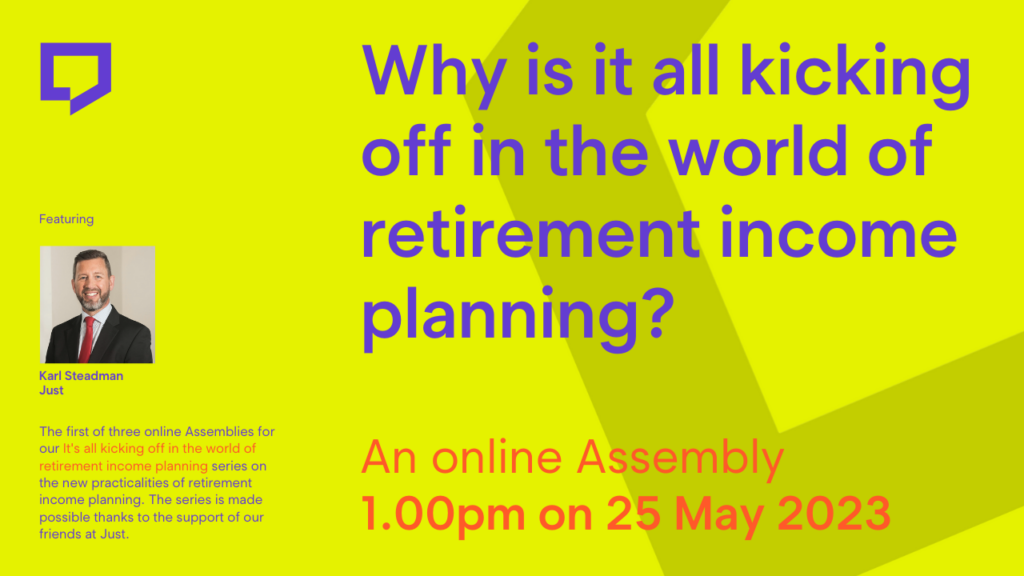
Starting any career feels like a leap into the unknown. How do you know if paraplanning is right for you? How do you get your first break? What do you actually need to know to succeed?
Whether you’re fresh from education, switching careers, or taking those first steps in paraplanning, getting established isn’t easy. But here’s the thing: every successful paraplanner started exactly where you are now.
Learn from people who have walked in your shoes
Join us online at 12.30pm on 9 July to hear from paraplanners who’ve faced exactly the same challenges and come out the other side.
Host Caroline Stuart will be joined by guests Chris Wormwell, Ceetal Katechia and Kez Condy – paraplanners who’ve who have both taken different routes into the profession – and Sarah Purves, learning and organisational development consultant, who’ll share practical ideas to build your career.
Together, they’ll explore the real stories behind successful paraplanning careers – from barista to paraplanner, marketing professional to financial planning, and administration assistant to qualified paraplanner.
We’re ever so grateful to Aegon whose support has made this Assembly possible, enabling us to bring together different perspectives that could help you work out where to go next in your career.
What you’ll discover
- Multiple pathways into paraplanning (spoiler: there’s no single “right” route)
- How to overcome the obstacles that everyone faces starting out
- Building a career plan that will work for you
- Creating the support network you need around you
- Tackling imposter syndrome head-on
- Conversations to have with current or prospective employers
- How employers can better support newcomers to the profession
What can you expect to take away?
You’ll leave this Assembly with practical insights about breaking into paraplanning, confidence about your career direction, and – most importantly – the knowledge that your questions and concerns are completely normal.
This session will give you strategies to start and develop your paraplanning career and connect with others on the same journey.
Whether you’re considering paraplanning, just starting out, or you’re an experienced paraplanner keen to help others, we’d welcome you to this conversation.
Sound like a good idea? Save your spot now.
Now don’t take this the wrong way, but is there a chance that last time you put together recommendations or financial plans for a woman, the approach was unknowingly influenced by assumptions that generally apply to a man?
As paraplanners, we have the power to directly influence financial outcomes that are better for women – whether we’re reviewing fact finds, drafting recommendations, or creating financial plans.
But are we truly creating plans for the individuals in front of us? Or are we unwittingly relying on conventional thinking and assumptions which are actually more likely to be rooted in men’s experiences rather than women’s?
It matters because, more often than not, women’s financial lives are very different to men’s. So to deliver genuinely effective financial planning, it’s important to understand the differences and how to adapt our approach.
A chance to challenge your thinking
In the recording of this online Assembly, host Sam Tonks invited Sam Secomb of Women’s Wealth and Susan Hope of Scottish Widows to explore how paraplanners can better understand and address the unique financial planning needs of women.
Together, they discussed women’s distinctive financial journeys and the stark disparities that exist – including the startling 30 per cent gender pension gap – and asked how paraplanners can help create better financial outcomes for female clients. During the session Sam, Susan and Sam discuss
– what makes women’s financial experience so different from men’s
– the real-world impact of the ‘parenthood penalty’ on long-term financial planning
– our assumptions about vulnerabilities, risk profiles and investment preferences
– practical strategies paraplanners can implement to better serve female clients
What will you learn from this Assembly?
You’ll gain actionable insights that we’re certain will help you improve your paraplanning approach, challenge conventional thinking and assumptions, and help deliver more tailored financial plans for your female clients.
Plus, you’ll discover practical tools and ideas so you’re equipped to improve financial outcomes for women right away.
Interested? Then tune in now.
How often do you recommend investment bonds compared to ISAs or GIAs for non-pension money these days?
If it’s rarely or not at all, that’s not so surprising.
Because bonds seem to have become a bit neglected planning option in recent years haven’t they?
It’s a trend which means that paraplanners can be forgiven for being a bit rusty when it comes to the latest investment bond knowledge.
Yet they’re an option which offers plenty of planning potential. So we thought it was about time we hosted an online Assembly where you can rekindle your bond with bonds.
So you’re invited to join us online at 1pm on Wednesday 16th April for a lunch-hour refresher on the essentials of investment bonds.
To guide us, we’ll be joined by bond expert, M&G’s Barrie Dawson, who plans to cover:
- What bonds actually are
- Common jargon (that’s often misunderstood)
- How bonds are taxed internally – and why the ‘20% tax rate’ misunderstanding persists
- When bonds make sense: practical comparisons with other investment options
Whether bonds are something you’re just getting to grips with, or you just need a refresher, this Assembly will offer clarity about when and how bonds bonds can feature in your planning recommendations.
Learn, fix, share
It’s an Assembly, so feel free to ask questions and share ideas with other paraplanners in the chat. Oh and CPD certificates will be available for all attendees (just look out for the link at the conclusion of this Assembly).
Book your spot now.
Sound interesting? Then tap ‘Book event’ to save your spot and we’ll see you there!
Scottish Widows’ pensions specialist (and Big Day Out 2024 ‘Quiz the Expert’ alumnus), Gareth Davies, joins host, Richard Allum, for the follow-up to his popular ‘Is there a recipe for successful retirement income advice?‘ Assembly which we held back in June.
Why a second helping?
An unbelievably busy Chat meant that Gareth fielded a fair few comments and questions which left too much ground to cover in just one lunch hour. So Gareth agreed to come back later in the year to conclude his survey of the retirement advice landscape.
In this concluding Assembly, Gareth and Richard…
- Revisit the annuities vs. drawdown debate – examining the case for ‘annuities plus drawdown’, exploring the latest annuity features, and discussing strategies for annuitising fully crystallised pension pots.
- Dig into pension death benefits: they’ll consider the options and potential pitfalls of death benefits – plus focus on the importance of nomination forms and their regular review.
- Assess the effect of regulatory change: if there’s time, they’ll consider how the FCA’s thematic review is influencing retirement income advice, what it may mean for centralised retirement propositions, and what it means for your ongoing assessment of suitability.
It makes for a lunch-hour Assembly that’s packed with valuable insights and practical ideas that you can apply to client cases right away.
Believe it or not, it’s already been nine years since the introduction of pension freedoms. And while it’s fair to say that the arrival of drawdown has transformed the way that clients can plan income in retirement, when the new measures were announced back in 2015, they were made against the backdrop of a generally benign economic climate.
What had changed and what could paraplanners do?
Today, high interest rates and stubborn inflationary pressure, coupled with greater regulatory scrutiny courtesy of The Consumer Duty and the FCA’s retirement income review, make for altogether more changeable weather.
So how are paraplanners expected to make forecasts and hatch plans that will deliver sustainable incomes for clients in their retirement? Plans that stack up under scrutiny – and against the demands – of The Consumer Duty?
During this lunch-hour Assembly, Gareth not only explored these issues but dug into other considerations that could influence paraplanners, advisers and clients when thinking about accumulation and decumulation strategies including:
- Cash flow modelling and stress testing – and its importance
- Is it ‘annuities vs drawdown’ or ‘annuities + drawdown’?
- Platform selection and what to consider
- The abolition of lifetime allowance – what does it mean?
No matter what your experience or expertise as a paraplanner, this 60-minute session offers insights and ideas when considering options for successful and sustainable income in retirement for your clients.
Richard Allum and Paradigm Norton’s Dan Atkinson get to grips with the topic of planning assumptions.
For what seemed like AGES, low interest rates and low inflation rates gave the impression that the factors affecting a client’s future were pretty predictable.
But more recently, roller-coaster interest and inflation rates, combined with pandemics and wars, could leave you thinking that the future is altogether more unpredictable.
But is it?
Assumptions that are fit for purpose
During this online Assembly, Dan and Richard explored ways to think about planning assumptions in future.
They considered the kind of indicators you can use to form a set of assumptions with the durability to withstand those periodic headwinds sparked by social, economic and environmental events – the kind that have dominated our lives lately.
Of course investments are important but healthspans, death, inflation, spending, retirement, care and more have the potential to feature.
And then there are clients with specific outcomes in mind to add to the mix – for instance, meeting school fees, saving to offset childrens’ university tuition fees or deposits for their first homes.
Don’t miss out
Tune in and you’ll discover you’re in good company. Not only is Dan responsible for Paradigm Norton’s financial planning assumptions, he also owns a crystal ball (he actually does) so – one way or another – he’ll have all bases covered.
Listen now

Popular Assembly regular, Les Cameron of M&G Wealth, joined us in something of a follow-up to last November’s online Assembly on financial planning essentials for small businesses.
As you’ll know if you tuned into that Assembly, there are already plenty of reasons for business-owning clients to consider investing surplus profits rather than, for instance, taking them as income.
But April’s 6p rise in corporation tax could add impetus to business owners interest in weighing up their options.
Yet there’s so much uncertainty around these days – even about once relatively dependable vehicles like bonds – so what strategies should you be considering for clients with businesses?
During this lunch-hour online Assembly, Les explored investment options, discuss tax treatments and tackle the topic of demonstrating suitability.
So if you have clients with businesses – or run a business yourself – why not tune in?

This was the third in our three-part series of It’s all kicking off in the world of retirement income planning Assemblies exploring the new practicalities of retirement income planning – a series made possible with the support of our friends at Just.
In the first Assembly, we looked back at the events that changed the world of retirement income and what the consequences of this change means for paraplanners, advisers and clients.
In our second, we considered the practicalities of researching, creating and executing a plan for clients.
In the third and final part of the series, we explored three case studies – each allowing us to consider the suitability of different strategies to meet the ambitions for retirement income of each client. To help, we were joined by Karl Steadman from Just.
Naturally, we also considered how the Consumer Duty affects the choices available too.
CPD and resources
Scroll down to see links to resources mentioned during the event plus a video replay and podcast episode link.
You’ll also see that we’ve published a link to a CPD survey. Once you complete the survey, a CPD record of your attendance will be emailed to you automatically.
Catch up with parts one and two
If you missed the first two Assemblies in the series, pop over to the Why is it all kicking off in the world of retirement income planning? (Part 1) and Getting real: the new practicalities of retirement income planning (Part 2) where you’ll find a video replay and podcast episode link plus links mentioned during the event.

Join us online at 1pm on 1 June 2023 for the second in our series of It’s all kicking off in the world of retirement income planning Assemblies exploring the new practicalities of retirement income planning – a series made possible with the support of our friends at Just.
In our first Assembly, we asked why it’s all kicking off in the world of retirement income and considered events that have prompted paraplanners to consider an expanding range of strategies to help clients achieve their retirement income goals.
In this Assembly we’ll be getting real by digging into the paraplanning practicalities. During the lunch hour session we expect to cover:
- what the research says
- using forecasting software to consider annuities and secure lifetime income
- looking at modelling examples
- what it all means for assets under management and client risk profiles
- how it works on a platform
To help, we’ll be joined by guests Jean-Paul Grenade and Karl Steadman from Just.
CPD and resources
Following this Assembly we’ll publish links to resources mentioned during the event on this page plus a video replay and podcast episode link,
We’ll also publish a link to a survey. Once you complete the survey, a CPD record of your attendance will be emailed to you automatically.
Book the final session in the series now
In the third and final part of the series – you can book your spot here now – we’ll be gathering online at 1pm on 8 June 2023 to explore three case studies. Each case will allow us to consider the suitability of different strategies to meet the ambitions for retirement income of each client. Naturally, we’ll be considering how the Consumer Duty affects the choices available too.
Watch part one
If you missed the first Assembly in the series, pop over to the event page – visit Why is it all kicking off in the world of retirement income planning? – where you’ll find a video replay and podcast episode link plus links mentioned during the event.

Years of stability in the retirement income planning world changed abruptly on 23 September 2022 when former Chancellor of the Exchequer, Kwasi Kwarteng, presented his ‘mini budget’.
Ever since, uncertainty about rising interest rates, anxieties about inflation, and even worries over the stability of pension funds themselves, have led paraplanners to rethink how clients can achieve the outcome they want from their financial plan.
One consequence of all this? Secure lifetime income has become a thing. And annuities are back in fashion.
What’s more, the demands of the consumer duty means more and more firms are kicking the tyres of their centralised retirement propositions to test suitability – or are setting one up for the first time.
In other words IT’S ALL KICKING OFF IN THE WORLD OF RETIREMENT INCOME PLANNING. And in the eye of the storm (because it does feel a bit like that doesn’t it?) there are paraplanners.
So how are we supposed to make sense of it all? What do we need to know? And what should we be doing about it? (And – while we’re talking about it – how DOES an annuity work?)
It’s all kicking off in the world of retirement: a series of online Assemblies with Just
Working with our friends at Just, we’re hosting a series of three online Assemblies to help you understand where we are, how we got here and – by combining case studies and practical tips – give you the knowledge you need to navigate what’s ahead.
1pm on 25 May 2023: Why is it all kicking off in the world of retirement?
In this first session in the series, we were joined by Karl Steadman from Just to explore what’s changed in the world of retirement income planning and what it means to paraplanners. During the Assembly we covered:
- what’s happened in the economy and markets
- why things won’t be the same again
- what it all means
- income stability and sustainability
- what is an annuity
- assessing attitude to risk
Save your spot at the second and third Assemblies in this series
The second Assembly in this series – ‘Getting real: the new practicalities of retirement income planning’ – is taking place at 1pm on 1 June. For more info and to save your spot now visit the event page now.
Join us online for the third and final Assembly – called ‘The realities of retirement income: clients, case studies and consumer duty’ – which starts at 1pm on 8 June. Grab your spot and get more info here.

